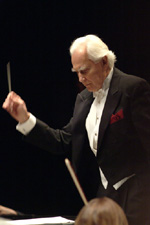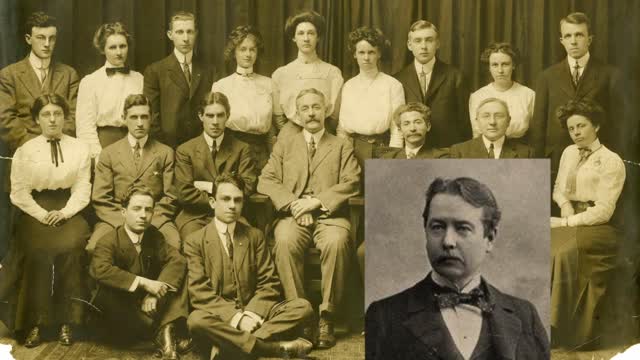
The son of a professional football player, Kenneth Schermerhorn studied clarinet, violin and trumpet while at school. At the age of fourteen he joined a dance band that played in night clubs, and quickly moved on to form his own five-piece band, The Blue Moods, with which he sang as well as played the trumpet. When he was seventeen he entered the New England Conservatory of Music, Boston, from which he graduated in 1950. He then played the trumpet with the Boston Symphony and the Kansas City Philharmonic Orchestras, as well as with several other ensembles. He was drafted into the US army in 1953, and gained his first experience of conducting in Germany with the US Seventh Army Symphony Orchestra. He was highly praised for performances of Fidelio at Passau in 1954, and for a concert given by the USSASO at the Royal Albert Hall, London. Later he was awarded the Harriet Cohen International Award for Young Conductors and the Elizabeth Sprague Coolidge Medal.
After leaving the US army Schermerhorn taught at the New England Conservatory during 1956 and studied with Leonard Bernstein at Tanglewood, where he won the Serge Koussevitzky Conducting Award for two years running. He served as assistant conductor to Bernstein with the New York Philharmonic Orchestra during the 1959–1960 season, as well as at La Scala, Milan. Bernstein was a major influence upon Schermerhorn: ‘He was my first real and certainly my most important teacher… He was a person of such musical magnitude, of such easy, frictionless genius…’
At the age of twenty-eight, in 1957, Schermerhorn had been appointed chief conductor of the American Ballet Theatre. He held this position with the company until 1968, and again between 1982 and 1984. His first appointment with an American orchestra was as chief conductor of the New Jersey Symphony, from 1963 to 1965, after which he became chief conductor of the Milwaukee Symphony Orchestra, from 1968 to1980. He built this ensemble into a major musical force, accomplishing eight national tours, and leading the orchestra in its Carnegie Hall debut and at five return engagements.
Between 1984 and 1988 Schermerhorn held the post of chief conductor of the Hong Kong Philharmonic Orchestra. Once again he dramatically developed the orchestra, to the point that at his departure it was held by many critics to be Asia’s finest classical music ensemble. Schermerhorn’s final post, which he took up in 1983, was as chief conductor of the Nashville Symphony Orchestra. He stayed with this orchestra during difficult financial times in the 1980s and through shrewd programming, strong management appointments, and intensive fund-raising, built it into a major force for cultural development in the southern USA. In 1998 conductor and orchestra signed a contract with Naxos Records which resulted in numerous releases, predominantly of American music, four of which were nominated for Grammy Awards. An active opera conductor, Schermerhorn led the gala celebration of the Metropolitan Opera’s Centennial in 1983, and conducted the opera companies of San Francisco, San Diego, Edmonton, Baltimore, Pittsburgh, San Antonio, Milwaukee (Florentine), and Nashville. In the USA his guest-conducting engagements included concerts with the New York Philharmonic, Philadelphia, Boston Symphony, and Cleveland Orchestras amongst many others. Schermerhorn died in 2005 after a short battle with non-Hodgkin’s lymphoma. The Schermerhorn Symphony Center, a state-of-the-art concert hall named in his honour and largely inspired by him, was opened in the autumn of 2006.
The list of Schermerhorn’s recordings is extensive. He recorded Barber’s Symphony No. 1 with the Milwaukee Symphony Orchestra for Turnabout, and for Marco Polo he conducted the Hong Kong Philharmonic in recordings of Glazunov, Villa-Lobos, Richard Strauss and, with Takako Nishizaki as soloist, a particularly well-received recording of Cesar Cui’s Suite Concertante Op. 25. A keen supporter of contemporary music, he led the Hong Kong orchestra in a disc of works by Chinese composers made on the occasion of the First Contemporary Chinese Composers’ Festival held in 1986. For the Naxos label he conducted the Slovak Radio Symphony Orchestra in a recording of orchestral works by Sibelius (he was awarded the Sibelius Medal in 1979 from the Finnish government for his outstanding performance of works by this composer) and his own Nashville Symphony in recordings of music by Beach, Beethoven, Hanson and Ives.
© Naxos Rights International Ltd. — David Patmore (A–Z of Conductors, Naxos 8.558087–90).
| Title | |
| Charles Ives' America (Dvorak's Prophecy) (Film 2, 2021) | |

|
Charles Ives' America (Dvorak's Prophecy) (Film 2, 2021)
Composer:
Ives, Charles
Artists:
Mayer, Steven -- Sanchez, Paul T. -- Schermerhorn, Kenneth -- Sharp, William -- Sinclair, James
Label/Producer: Naxos |
